What Are the 4 Types of SEO?
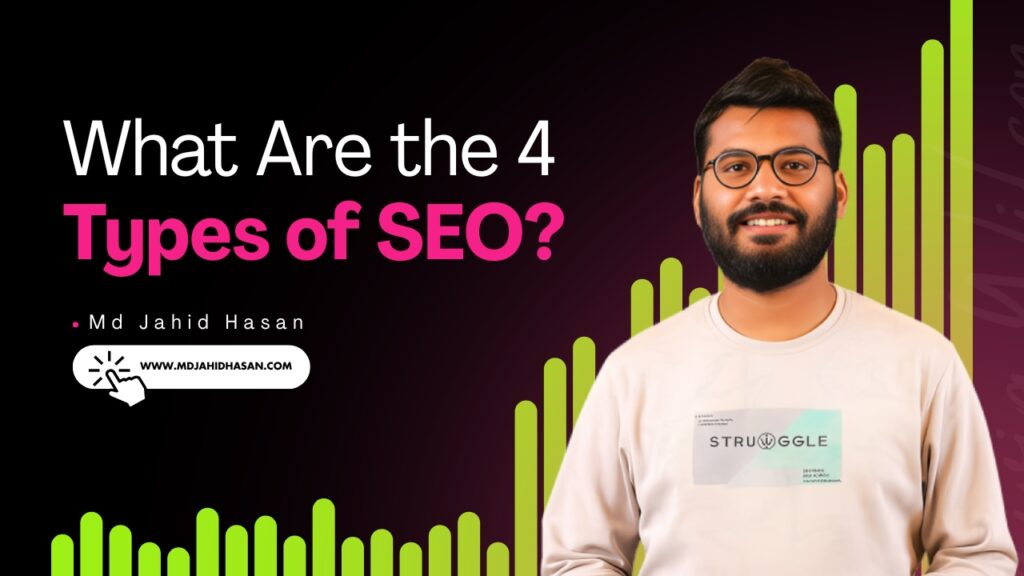
What Are the 4 Types of SEO? A Complete Guide for Beginners (2025 Update) Understanding the Core SEO Types to Boost Your Online Visibility in Columbus, Ohio If you’re diving into digital marketing or trying to grow your business online, one of the first questions you’ll ask is: What are the 4 types of SEO? Search Engine Optimization (SEO) is the foundation of organic growth, but mastering it starts with understanding its core components. In this guide, I break down the four major types of SEO, explain how they work, show examples, and share beginner-friendly strategies. Whether you’re a business owner in Columbus, Ohio, a digital marketer, or just learning SEO, this article is designed for you. What Is SEO? SEO (Search Engine Optimization) is the practice of optimizing your website so it appears higher on search engines like Google, Bing, and Yahoo. It includes strategies that help your content rank, attract more visitors, and convert them into customers. Why Understanding SEO Types Is Important Many beginners focus on one or two tactics and miss the full picture. When you understand the different types of SEO, you can: Target the right audience Rank higher for competitive and low-competitive keywords Improve user experience Build long-term online visibility Grow your business organically Quick Overview: What Are the 4 Types of SEO? The four main types of SEO are: On-Page SEO Off-Page SEO Technical SEO Local SEO These SEO categories work together to boost search rankings. Let’s break them down. 2. What Are the 4 Types of SEO? (Main Section) When people search “what are the types of SEO?” or “different types of SEO explained,” these four always come up: On-Page SEO: Optimizing content and elements on your website Off-Page SEO: Improving authority through backlinks and brand signals Technical SEO: Ensuring your site is fast, crawlable, and structured properly Local SEO: Ranking for local searches like “near me” or “Columbus Ohio services” These types of SEO in digital marketing work together like a system—each one supports the others. 3. On-Page SEO (Type 1) What Is On-Page SEO? On-page SEO refers to optimising the content and HTML elements on your website to help search engines understand the content of your pages. This is where you have direct control. Importance of On-Page SEO This is the foundation of search rankings. If your on-page optimization is weak, no amount of backlinks or technical SEO will save you. Key On-Page SEO Techniques Use these on-page SEO techniques to strengthen your website: Keyword placement strategies (title, H1, H2, intro, conclusion) SEO content optimization (high-quality, valuable content) Meta tags optimization (meta titles, descriptions) Image SEO (alt-text, compression) Internal linking URL optimization On-page SEO checklist: titles, headers, URL, content, images, schema Examples of On-Page SEO Adding your keyword “what are the 4 types of SEO?” in the title Writing 1500-word long-form content Adding related LSI terms like “SEO types explained” On-page SEO is the easiest SEO type for beginners to start with. 4. Off-Page SEO (Type 2) What Is Off-Page SEO? Off-page SEO is all about strengthening your website’s authority outside your website. It includes activities that show Google your brand is credible and trustworthy. Why Off-Page SEO Matters Google uses external signals—especially backlinks—to determine if your content deserves to rank. The stronger your backlink profile, the stronger your domain authority becomes. Effective Off-Page SEO Techniques Here are essential off-page SEO techniques: Backlink strategies (guest blogs, niche edits, resource links) Types of link building (editorial, contextual, directory, citations) Improve domain authority with high-authority backlinks Social sharing strategies Online reputation management SEO Influencer marketing Brand mentions Press releases Off-Page SEO Example If you’re a business in Columbus, Ohio, getting featured on local blogs, forums, or local directories boosts your local authority. 5. Technical SEO (Type 3) What Is Technical SEO? Technical SEO focuses on how search engines crawl, index, and understand your site. It ensures your website meets Google’s technical requirements. Key Areas of Technical SEO Use this technical SEO checklist: ✔ Website Speed Optimization A slow website kills rankings. Improve speed with: – Lazy loading – CDN – Compressing files – Caching – Minifying CSS/JS ✔ Indexing & Crawling Help search engines crawl your website effectively: – Fix broken links – Use robots.txt properly – Submit sitemap – Improve website crawling structure ✔ Mobile-Friendly Optimization More than 60% of users search on mobile—especially local users in Columbus, Ohio. ✔ Core Web Vitals Google measures: – Loading – Interactivity – Visual stability ✔ Schema Markup SEO Add structured data to help Google better interpret your content. ✔ XML Sitemap + Robots.txt These files guide search engines on what to crawl and what to skip. 6. Local SEO (Type 4) What Is Local SEO? Local SEO helps your business rank for local searches like: “coffee shop near me” “plumber Columbus Ohio“ “best car insurance near me” It is especially important for small and service-based businesses. Why Local SEO Matters (Especially in Columbus, Ohio) Local businesses depend on Google Maps visibility. Strong Local SEO brings: More phone calls More walk-in customers More leads and bookings Local SEO Strategies Use these local SEO techniques: ✔ Google Business Profile Optimization Add photos Update NAP Optimize business description Use Google My Business Optimization Tips ✔ Local Citations & NAP Consistency NAP = Name, Address, Phone ✔ Local Keywords Targeting Examples: – “Best SEO expert Columbus Ohio” – “Roof repair near me Columbus OH” ✔ Customer Reviews Ranking Factors Quantity Quality Velocity Keywords in reviews Response rate ✔ Local SEO for Small Businesses Restaurants, roofers, lawyers, and service providers gain the most. 7. Comparison Table: 4 Types of SEO SEO TypePurposeBest ForTechniques On-Page SEO: Improve content quality & keyword ranking Bloggers, businesses, beginners Meta tags, keywords, content optimization. Off-Page SEO: Build website authority Businesses needing credibility Link building, social signals, brand mentions. Technical SEO: Improve site performance & crawlability All websites Speed optimization, schema, indexing. Local SEO: Rank for local searches & Google Maps Local businesses GBP optimization, citations, local keywords. 8. Why Understanding These 4 SEO
SEO Tips For Small Businesses You Need To Know
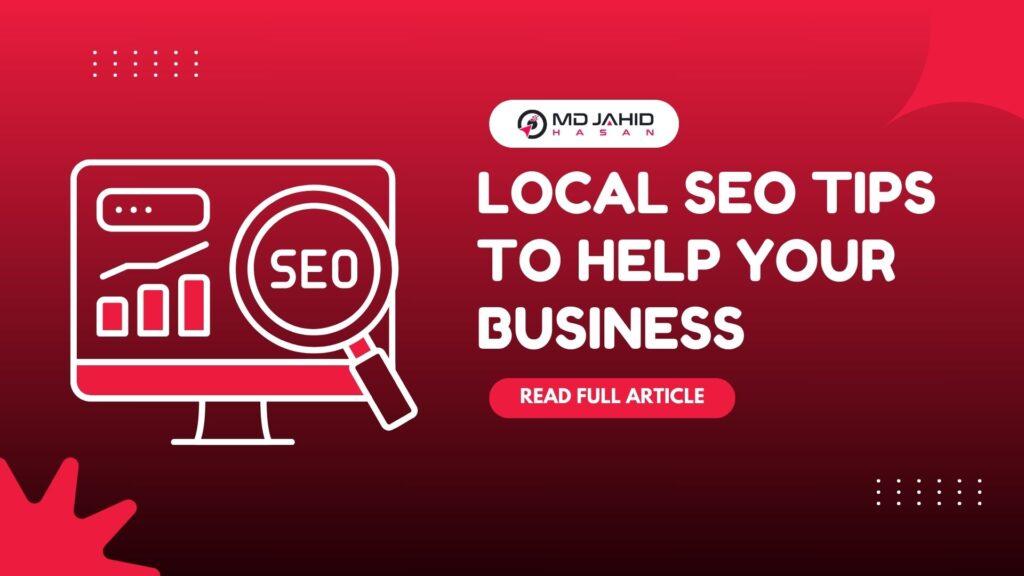
SEO Tips for Small Businesses In today’s competitive digital world, small businesses need more than just a great product or service—they need visibility. SEO tips for small businesses can be the secret weapon to unlock powerful growth and outshine competitors. If you’re a small business owner wondering what is SEO and how it works, this blog is your guide to smart, effective, and scalable strategies. Md Jahid Hasan, an experienced SEO expert in Bangladesh, shares valuable insights to help small businesses dominate online. 📞 Call WhatsApp: +8801821207679 🌐 Visit: https://mdjahidhasan.com/consultancy/ What is SEO and How It Works? Let’s start with the basics. What is SEO? SEO (Search Engine Optimization) is the practice of optimizing your website to improve its visibility on search engines like Google. When done right, SEO drives organic (unpaid) traffic to your site, helping potential customers discover your business. How does SEO work? It works by aligning your website’s content, structure, and authority with search engine algorithms. These algorithms rank websites based on relevance, quality, and user experience. Using the right keywords, creating valuable content, and earning backlinks can help you climb higher on search engine results pages (SERPs). Why SEO Matters for Small Businesses Small businesses often rely on local customers. And where do people turn when they need a service or product? Google! That’s why Google SEO for small businesses is essential. With the right techniques, you can compete with bigger brands—even with a smaller budget. Here’s why: Increased Visibility: Ranking on the first page of Google boosts brand recognition. More Traffic: Higher visibility leads to more website visits and potential sales. Cost-Effective Marketing: SEO is cheaper and more sustainable than paid ads. Local Discovery: Local SEO helps nearby customers find you easily. Best SEO Tips for Small Businesses Let’s break down the top Best SEO tips for small businesses that actually work: 1. Optimize Your Website for Local Search Engines Claim and optimize your Google My Business listing. Add accurate contact info, business hours, and photos. Encourage satisfied customers to leave reviews. Local keywords like “best SEO service in Bangladesh” “Best SEO company in Bangladesh”, “Best local SEO in Dallas”, “Best Local seo in Dallas” ”Best Roofing Company Across Ohio” ”Dallas Photo Booth Rental Company” help Google connect you with nearby searchers. 2. Use the Right Keywords Understand what your audience is searching for. Use tools like Google Keyword Planner or Ubersuggest to find keywords like: SEO tips for small businesses. How to do SEO for a website step-by-step. SEO for business growth. Tools like Google Keyword Planner, Ubersuggest, and Ahrefs can help find relevant terms. 3. Create Quality, Relevant Content Write informative blog posts, FAQs, and guides that answer your audience’s questions. Content should be original, useful, and include bold keywords for internal and external links. Blogging regularly helps Google index your website more often. For example: “What is SEO and how it works” “How to do SEO for website step-by-step” 4. Focus on Local SEO Target keywords with location, such as: “Best SEO services in Ohio” “Local SEO expert near me” 5. Mobile Optimization Over 60% of users access websites via mobile. Ensure your site is mobile-friendly and fast-loading. Google prioritizes mobile-first indexing, so a slow or poorly designed mobile site can hurt your rankings. 6. Build Backlinks Backlinks (links from other websites to yours) are a strong trust signal. Reach out to local blogs, directories, or partner businesses to get listed or guest posts. Always link back with bold keywords like Local SEO tips for small businesses. You can: Write guest posts. Get listed in business directories. Collaborate with influencers. 7. Improve On-Page SEO Include your primary keywords in the: Title tags. Meta descriptions. Header tags (H1, H2, H3). Image alt texts. URL structures. Also, use internal linking to guide readers to other relevant on-page pages on your site. How to Do SEO for a Website Step-by-Step Here’s a simple breakdown of how to do SEO for a website step-by-step: Website Audit – Check for technical issues and errors. Conduct Keyword Research: Identify target keywords using SEO tools. On-Page SEO – Optimize titles, meta descriptions, headings, and content. Optimize Website Structure: Ensure clean URLs, responsive design, and fast load speed. Publish Optimized Content: Write blogs using your target keywords naturally. Set Up Google Search Console & Analytics: Monitor site performance and crawl issues. Build Backlinks: Reach out to industry blogs, directories, and influencers. Regularly Update Your Content: Keep your website fresh and relevant. Local SEO – Claim your Google Business Profile and get local citations. Monitoring and Updates – Use analytics tools to refine your strategy regularly. SEO for Business Growth SEO is not a one-time task—it’s a long-term strategy that fuels business growth. Here’s how it helps: Builds Trust and Authority: High-ranking pages are perceived as more credible. Increases Conversions: SEO brings in warm leads actively searching for your services. Supports Other Marketing Efforts: Great SEO boosts PPC, social media, and email marketing by driving traffic and increasing brand awareness. FAQs about SEO for Small Businesses Q1: What is SEO, and why is it important for small businesses? A: SEO helps your website rank higher on search engines. For small businesses, it’s a cost-effective way to attract local and global traffic, build trust, and increase sales. Q1: How long does it take to see SEO results? A: SEO is a long-term strategy. You may start seeing results in 3 to 6 months, depending on your industry and competition. Q2: Can I do SEO myself or should I hire an expert? A: Basic SEO can be done by yourself using guides and tools. However, hiring an expert like Md Jahid Hasan can save time and deliver faster results. 03. What are some common SEO mistakes small businesses make? Ignoring mobile optimization. Keyword stuffing. Not updating content regularly. Skipping technical SEO. Not using analytics. Q3: What’s the cost of SEO for small businesses? A: Costs vary by region and provider, but SEO offers great ROI compared to traditional ads. Q4:
Photo Booth Rental Dallas SEO Case Study
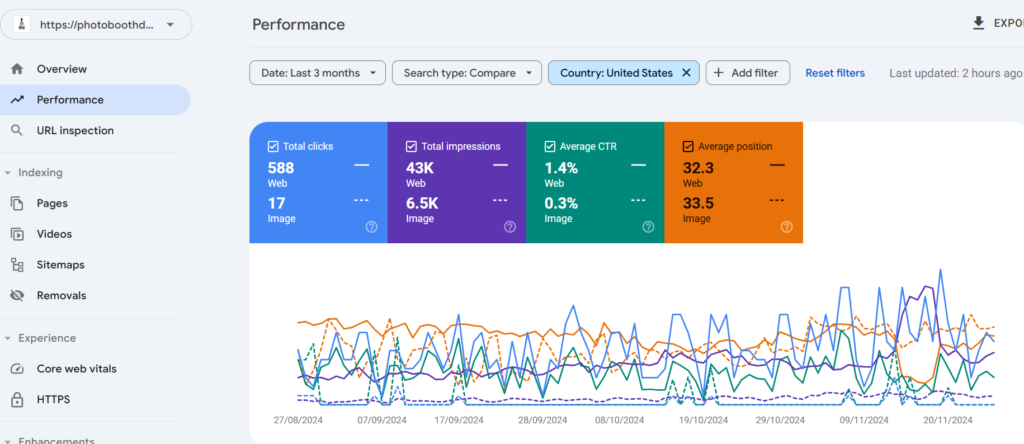
SEO Success Case Study: Increasing Organic Traffic by 150% for a Dallas Photo Booth Rental Company Photo Booth Rental Dallas SEO Case StudyAs a seasoned SEO expert, one of the most satisfying experiences is helping small businesses grow their online presence and improve their rankings. This case study highlights how I was able to increase the organic traffic of a Dallas-based photo booth rental company by 150% in just three months. The client, which offered a range of photo booth services such as Dallas Photo Booth Rental, Mirror Photo Booth Rental Dallas, LED Photo Booth Rental in Dallas, 360 Photo Booth Rental Dallas, and Wedding Audio Guest Book Rental Dallas, was struggling to generate sufficient online traffic and leads. Through a targeted SEO strategy, We turned things around, achieving measurable results and increasing visibility. How we achieved 60+ Business Calls and 300% Organic Traffic for Dallas Photo Booth Rental Company The Challenge The Dallas Photo Booth Rental Company faced several challenges: Low Organic Traffic: Despite having a functional website, the company wasn’t attracting enough visitors. Most of their traffic was coming from paid ads, and organic search was minimal. Highly Competitive Market: The photo booth rental industry, especially in large metropolitan areas like Dallas, was highly competitive. Numerous competitors were already ranking for key terms like “photo booth rental Dallas” and “360 photo booth rental Dallas,” making it difficult for the company to stand out. Lack of Keyword Optimization: The website wasn’t optimized for relevant keywords that potential customers were using to search for photo booth services. This made it challenging to rank for valuable search queries related to photo booth rentals, particularly more niche offerings like LED Photo Booth Rental in Dallas or Wedding Audio Guest Book Rental Dallas. The SEO Strategy To address these challenges and increase organic traffic, I implemented a comprehensive SEO strategy focusing on several key areas: 1. Keyword Research & Targeting The first step in the SEO strategy was conducting thorough keyword research to identify both broad and long-tail keywords that potential customers were searching for. For example, high-volume keywords like “Dallas Photo Booth Rental” and “Mirror Photo Booth Rental Dallas” were essential to target. However, we also focused on niche keywords that could attract more specific leads, such as: LED Photo Booth Rental in Dallas 360 Photo Booth Rental Dallas Wedding Audio Guest Book Rental Dallas By focusing on both high-competition and long-tail keywords, we ensured the business had a well-rounded SEO approach. 2. On-Page SEO Optimization Next, I optimized the website’s on-page SEO elements, including: Meta Tags: We updated title tags, meta descriptions, and header tags (H1, H2, etc.) with target keywords for each service page. For example, the title for the main page became: “Photo Booth Rental in Dallas | LED, Mirror, 360 Booths & More”. Content Optimization: I updated existing content to naturally incorporate the target keywords. Each service page now featured detailed descriptions of offerings like the 360 Photo Booth Rental Dallas and Wedding Audio Guest Book Rental Dallas, focusing on what set these services apart. Internal Linking: I created a strong internal linking structure to ensure that all service pages were properly linked to one another, boosting both site navigation and SEO. 3. Local SEO & Google My Business Optimization Since the business was based in Dallas, it was crucial to implement local SEO strategies to attract customers in the area. I optimized the Google My Business (GMB) profile to ensure the company appeared in relevant local searches. Key tactics included: Complete GMB Profile: I added detailed information about the company’s services, including photos of the photo booths in use, customer reviews, and service areas such as Dallas, Plano, Fort Worth, and surrounding areas. Local Citations: I submitted the business to various local directories and citation sites to build local authority and improve the company’s visibility in Dallas-specific searches. 4. Content Marketing & Blogging To further boost traffic and authority, I developed a blog strategy to target additional long-tail keywords and engage users. Blog posts were created around topics like: “Top 5 Reasons to Rent a Photo Booth for Your Dallas Wedding” “How the LED Photo Booth Rental in Dallas Will Elevate Your Event” “The Best 360 Photo Booth Rental in Dallas for Corporate Events” This content not only helped the company rank for niche terms but also served as a valuable resource for potential clients, increasing their chances of booking a rental. 5. Link-Building Strategy A strong backlink profile is essential for SEO success, especially in a competitive market. I implemented a white-hat link-building strategy by reaching out to local event planners, wedding blogs, and Dallas-based event venues for collaboration opportunities. By getting backlinks from authoritative local websites, we were able to improve the site’s domain authority, which directly contributed to higher rankings. The Results After three months of consistent SEO efforts, the results were impressive: Organic Traffic Increase: The website saw a 150% increase in organic traffic, with a significant boost in visitors coming from search engines rather than paid ads. Higher Rankings: Several target keywords began ranking on the first page of Google, including high-competition keywords such as Dallas Photo Booth Rental and niche keywords like LED Photo Booth Rental in Dallas. Lead Generation: The company experienced an increase in leads and inquiries, especially for specific services like the Wedding Audio Guest Book Rental Dallas and 360 Photo Booth Rental Dallas, which were previously not ranking well. Brand Visibility: The business gained better visibility in local searches, appearing on Google Maps for searches like photo booth rental near me and wedding photo booth Dallas. Conclusion This case study demonstrates the power of a well-rounded, targeted SEO strategy. By focusing on keyword research, on-page SEO, local SEO, content marketing, and link building, we were able to overcome the challenges faced by the Dallas photo booth rental company and deliver measurable results. Within just three months, organic traffic increased by 150%, leading to more visibility and increased leads. This case proves that with the right SEO
10 Benefits of SEO for Small Businesses | Everything You Need to Know

What is SEO? Why is SEO Important? Search Engine Optimization (SEO) is the practice of enhancing a website to improve its visibility when people search for products or services related to your Benefits of SEO for Small Businesses on search engines like Google, Bing, and Yahoo. The better visibility your pages have in search results, the more likely you are to garner attention and attract prospective and existing customers to your small-medium business. Why SEO is Important for Small Businesses For small businesses, (SEO) Search Engine Optimization is a crucial benefit of SEO digital marketing strategy. It offers an effective way to compete with larger companies and reach potential customers who are actively searching for your services or products. By SEO optimizing your website for search engines, you can increase your online small business, drive more traffic to your site, and ultimately boost your sales and revenue. 10 Benefits of SEO for Small Businesses 1. Increased Visibility on SERPs One of the most significant benefits of seo optimization is improved visibility on search engine results pages (SERPs). By optimizing your website with relevant keywords and high-quality content, your site can appear higher in search results, making it easier for potential customers to find you. 2. Boosts Brand Awareness (SEO) Search Engine Optimization for small businesses helps in building brand awareness. When your website appears on the first page of search results, it increases your brand’s exposure. Even if users do not click on your site initially, repeated exposure can help build recognition and familiarity, leading to increased trust and future visits. 3. Drives Sales SEO is a powerful tool for driving sales. By targeting keywords that your potential customers are searching for, you can attract more qualified leads who are ready to make a purchase. This targeted approach ensures that you’re reaching people more likely to convert into customers. 4. Cost-effective Marketing Channel Compared to traditional marketing methods, SEO is highly cost-effective. While it requires time and resources, the long-term benefits far outweigh the costs. Unlike paid advertising, which stops delivering results once you stop paying, the effects of SEO can last for years. 5. Powerful Lead Generation Strategy SEO is an excellent lead-generation local SEO strategy. By optimizing your site for relevant keywords, you can attract users who are actively searching for your products or services. This results in higher-quality leads and a greater likelihood of conversions. 6. Helps Build Credibility and Authority Websites that rank higher in search results are generally perceived as more credible and trustworthy. Investing in SEO can build your site’s authority and reputation, making it easier to establish trust with potential customers. 7. Can Help Drive Local Traffic Local SEO is especially beneficial for small businesses with a physical presence. By optimizing your site for local searches, you can attract customers in your area who are looking for the services or products you offer. This can lead to increased foot traffic and local sales. 8. Higher Search Engine Rankings Achieving higher rankings on search engines is a key goal of SEO strategy. By implementing effective SEO strategies, your website can climb the search engine rankings, resulting in more visibility and organic traffic. 9. Generates Leads and Revenue SEO not only helps in targeted organic visitors but also in converting them into leads and customers. By providing valuable SEO content and a user-friendly seo experience, you can convert website visitors into paying customers, thereby generating more target leads and good revenue. 10. Boost Authority Effective SEO practices can help boost your site’s authority. When your site provides valuable content that meets users’ needs and adheres to search engine guidelines, it becomes a trusted source of information, further enhancing your authority in your industry. Why Your Business Needs SEO Every small business needs SEO to compete effectively in today’s digital landscape. Without a solid SEO strategy, your website may be buried in search results, making it difficult for potential customers to find you. Investing in SEO ensures that your business remains visible, relevant, and competitive. The Cons of SEO for Small Businesses While the benefits of seo for websites are substantial, it’s important to acknowledge the potential downsides: 🟩 Time-Consuming: SEO requires a significant investment of time and effort. Results are not immediate and can take several months to materialize. 🟩 Continuous Learning: SEO is constantly evolving. Staying up-to-date with the latest trends and algorithm changes can be challenging. 🟩 Competition: The competitive nature of SEO means that maintaining high rankings requires continuous optimization and improvement. 🟩 Initial Investment: The initial cost of hiring a local SEO professional or agency can be high, which may be a barrier for some small businesses. Benefits of SEO for Small Businesses: Your FAQs Answered Why is SEO Important for Small Businesses? SEO is important for small businesses because it helps them compete with larger companies, attract more customers, and increase their online visibility. It provides a cost-effective way to reach a wider audience and drive more traffic to their website. What are the Key Benefits of SEO for Small Businesses? The key benefits include increased visibility, higher search engine rankings, more targeted traffic, enhanced credibility and authority, improved user experience, and greater ROI compared to other marketing channels. What are the Best SEO Tools for Small Businesses? Some of the best SEO tools for small businesses include Google Analytics, Google Search Console, SEMrush, Ahrefs, Moz, and Yoast SEO for WordPress. These tools help with keyword research, performance tracking, and site optimization. The Benefits of SEO for Small Businesses: The Effort is Well Worth It! Despite the challenges, the benefits of SEO make the effort worthwhile. By investing in SEO, small businesses can achieve sustainable growth, build a strong online presence, and attract a steady stream of leads and customers. Is SEO a Valuable Investment for Small Businesses? Yes, SEO is a valuable investment for small businesses. It provides long-term benefits, improves online visibility, and drives targeted traffic, leading to higher conversions and sales. How Does SEO Impact Business
How To Find A Good SEO Consultant

How to Find a Good SEO Consultant for Your Business? Finding a good SEO consultant can be a game-changer for your business’s online presence. With search engines evolving rapidly, the need for expert guidance has never been greater. This guide will walk you through the essential steps to identify and hire an SEO consultant who can elevate your website’s ranking and drive organic traffic effectively. 1. What is an SEO Consultant? An SEO consultant is an expert who advises businesses to optimize their websites and improve their search engine rankings. They typically have deep knowledge of search engine algorithms, keyword research, website optimization tactics, and content strategies to increase organic traffic. 2. Define the role of an SEO consultant. The role of a Search engine optimization (SEO) consultant involves analyzing websites for improvements, conducting keyword research, developing SEO strategies, implementing changes, monitoring performance, and providing recommendations to enhance a website’s visibility in search engines like Google, Bing, and Yahoo. 3. Explain the difference between an SEO consultant and an SEO agency. An SEO consultant usually works independently or as part of a small team, offering personalized strategies and hands-on implementation. They provide direct communication and a tailored approach to each client’s needs. On the other hand, an SEO agency is a larger entity that offers a full range of digital marketing services, including organic SEO, paid advertising, content marketing, technical seo, on-page seo, link-building seo, and more. Agencies often handle multiple clients simultaneously and may have broader expertise across different digital marketing channels. 4. Why Hire a Good SEO Consultant for Your Business? Hiring a competent SEO consultant can bring several advantages: 🟩 Expertise: Consultants specialize in SEO and stay updated with the latest trends and algorithm changes. 🟩 Customized Strategies: They tailor strategies to fit the specific needs and goals of your business. 🟩 Cost-Effective: Compared to hiring a full-service agency, consultants often provide more SEO cost-effective solutions. 🟩 Personalized Attention: You receive dedicated attention and direct communication, ensuring your concerns are addressed promptly. 5. Discuss the benefits of hiring a competent SEO consultant. 🟩 Improved Search Engine Rankings: Consultants can help your website rank higher for relevant keywords, increasing organic traffic. 🟩 Increased Website Visibility: Better visibility leads to more exposure and potential customers finding your business. 🟩 Better User Experience: SEO consultants often optimize websites not just for search engines but also for a better user experience, which can lead to higher conversion rates. 🟩 Measurable Results: They focus on metrics and analytics to track progress and adjust strategies accordingly. 6. Highlight the impact of effective SEO strategies on business growth and visibility. Effective SEO strategies can significantly impact business growth by: 🟩 Driving Organic Traffic: Ranking higher in organic search results means more people visit your website without paid advertising. 🟩 Building Credibility: High rankings make your business appear more credible and trustworthy to potential customers. 🟩 Increasing Sales and Leads: More organic traffic and visibility often translate into more inquiries, leads, and sales. 🟩 Long-term ROI: SEO techniques can provide long-term benefits and a higher return on investment compared to other marketing strategies. 7. Understand Your SEO Needs Before you start your search, it’s crucial to understand what you need. SEO is a broad field that includes various aspects such as on-page SEO, technical SEO, link building, and content strategy. 🟩 Assess Your Current Situation: Identify the strengths and weaknesses of your current SEO strategy. 🟩 Set Clear Goals: Determine what you want to achieve – more traffic, higher rankings, better user engagement, etc. 8. Look for Experience and Expertise An experienced SEO consultant can provide valuable insights and strategies tailored to your business needs. Here’s how to evaluate their experience: 🟩 Industry Experience: Look for consultants with a proven track record in your industry. 🟩 Case Studies and Testimonials: Review their past projects and client feedback. Real-world results and client testimonials can provide insights into their effectiveness. 3. Check Their Knowledge and Skills SEO is constantly evolving, so it’s essential to find a consultant who stays updated with the latest trends and algorithm changes. 🟩 Certifications and Training: Check for certifications from reputable SEO bodies like Google Analytics Certification, SEMrush Certification, or HubSpot Content Marketing Certification. 🟩 Continuous Learning: A good consultant should be committed to ongoing learning and development. Ask about their recent training or industry conferences they’ve attended. 9. Evaluate Their Analytical Skills SEO is heavily data-driven. An effective consultant should have strong analytical skills to interpret data and make informed decisions. 🟩 Tools Proficiency: Familiarity with SEO tools like Google Analytics, Search Console, SEMrush, Ahrefs, and Moz is important. 🟩 Data Interpretation: They should be able to analyze website performance metrics, keyword rankings, traffic sources, and user behavior to refine strategies. 10. Assess Their Communication Skills Effective communication is vital for a successful SEO campaign. You need a consultant who can explain complex concepts in simple terms and update you on progress. 🟩 Transparency: They should be open about their methods and strategies. 🟩 Regular Updates: Look for consultants who provide regular reports and updates on the progress of your SEO campaign. 11. Understand Their Strategy and Approach A good SEO consultant should have a clear and strategic approach to solving your SEO challenges. 🟩 Customized Strategies: Avoid one-size-fits-all solutions. Your consultant should tailor strategies to your specific business goals and audience. 🟩 Ethical Practices: Ensure they follow white-hat SEO practices. Avoid consultants who promise quick results through unethical methods like black-hat SEO, which can lead to penalties from search engines. 12. Consider Their Availability and Support SEO is an ongoing process, not a one-time task. Make sure your consultant is available for ongoing support and updates. 🟩 Long-term Partnership: Look for a consultant who is interested in building a long-term relationship with your business. 🟩 Support Availability: Check their availability for consultations, strategy reviews, and support whenever you need assistance. 13. Compare Pricing and Packages Pricing can vary widely among SEO consultants. It’s essential to find a
Top 10 Local SEO Experts in Bangladesh You Should Know About (Updated List)
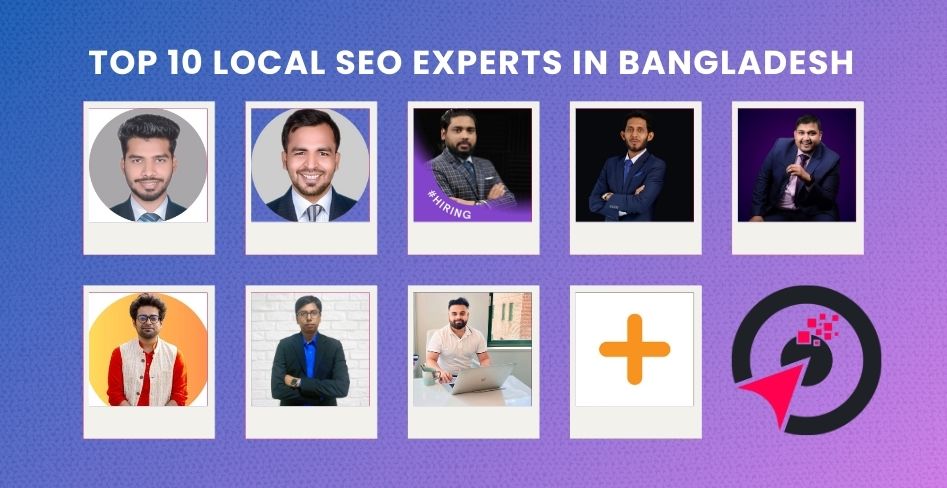
Local SEO Experts in Bangladesh Bangladesh has rapidly emerged as a hub for digital marketing and seo experts, with numerous professionals specializing in Search Engine Optimization (SEO). Whether you’re a local business owner looking to enhance your online local business or a marketer seeking to learn from the best, knowing the Top SEO experts in the country can be incredibly beneficial. Here, we spotlight the top 10 local SEO experts in Bangladesh, renowned for their expertise and success. Meet the Leading Local SEO Experts in Bangladesh 1. MD Jahid Hasan MD Jahid Hasan is a highly respected name in the SEO industry in Bangladesh. With 10+ years of experience in digital marketing and seo sector, he has helped numerous businesses achieve higher rankings on search engines. His strategic approach and in-depth knowledge of SEO techniques, SEO strategy, keyword research, technical seo, content marketing, link-building strategy expert, and Google My Business optimization. Make him a go-to expert for optimizing local search results. 2. HB Arif HB Arif is a leading figure in the SEO community of Bangladesh. Known for his innovative techniques and data-driven approach, Arif has assisted many local businesses in enhancing their online visibility. His specialties include local link building, content marketing, and Google My Business optimization. 3. Nazmul Hasan Nazmul Hasan has carved a niche for himself in the competitive SEO world. Known for his data-driven approach and meticulous attention to detail, He enhances website visibility and drives organic traffic. His ability to adapt to the ever-changing algorithms of search engines makes him a valuable asset in the SEO community. 4. Masum Billah Bhuiyan Masum Billah Bhuiyan is a prominent figure in the local SEO landscape. His extensive experience and strategic insights have enabled numerous businesses to thrive online. Bhuiyan’s expertise in keyword research, link building, and technical SEO is particularly noteworthy. 5. Habibur Rahman Habibur Rahman is known for his innovative SEO techniques and a deep understanding of search engine algorithms. He has a proven track record of boosting local search rankings for a diverse range of clients. Rahman’s holistic approach to SEO includes content optimization, local listings, and mobile SEO. 6. Khalid Farhan Khalid Farhan is a dynamic SEO expert with a flair for creative problem-solving. His proficiency in both technical and creative aspects of SEO has helped many businesses improve their online presence. Farhan’s unique strategies and thorough understanding of SEO principles set him apart from the competition. 7. Md Faruk Khan Md Faruk Khan is a seasoned SEO professional with extensive experience in local and international markets. His expertise includes SEO audits, competitor analysis, and performance tracking. Khan’s ability to tailor SEO strategies to specific business needs has garnered him widespread acclaim. 8. Hridoy Chowdhury Hridoy Chowdhury is an expert in local SEO with a keen eye for detail. His proficiency in optimizing websites for local search and his understanding of consumer behavior has led to significant improvements in search engine rankings for his clients. Chowdhury’s hands-on approach and dedication make him a top choice for businesses seeking local SEO services. 9. Fahim Hussain Fahim Hussain is another notable SEO expert who has made significant contributions to the industry. His skills in SEO strategy development, content marketing, and backlinking are exemplary. Hussain’s results-oriented approach ensures that his clients achieve measurable improvements in their search engine rankings. 10. Rafiul Islam Rafiul Islam is renowned for his expertise in digital marketing and SEO. His holistic approach encompasses everything from technical SEO to user experience optimization. Islam’s ability to stay ahead of SEO trends and implement effective strategies has made him a trusted advisor for many businesses. Conclusion These top 10 local SEO experts in Bangladesh are at the forefront of the SEO industry, each bringing unique skills and insights to the table. Whether you need comprehensive SEO services or specific local SEO strategies, these experts can help elevate your business’s online presence and drive significant organic traffic to your local business website. By leveraging their seo strategy expertise, you can stay ahead in the competitive digital landscape and achieve your business goals.
What Is Organic SEO? And Why It’s a Game-Changer for Your Business
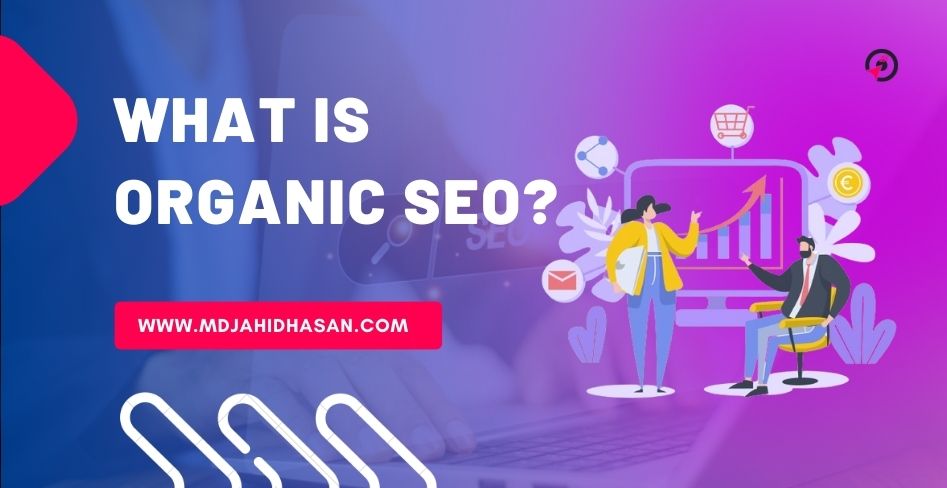
What is Organic SEO? Organic SEO refers to the process of optimizing a website to improve its visibility in search engine results pages (SERPs) naturally, without resorting to paid advertising. It focuses on enhancing various aspects of a website to make it more relevant and authoritative in the eyes of search engine algorithms. Why is Organic SEO Important? Organic Search engine optimization (SEO) holds immense importance in the digital realm due to several compelling reasons: Cost-Effectiveness: Unlike paid advertising, organic SEO does not require ongoing payments for clicks or impressions, making it a cost-effective long-term strategy. Credibility and Trust: Websites ranking high organically are perceived as more credible and trustworthy by users, leading to higher click-through rates (CTRs) and better conversion rates. Sustainable Results: With consistent effort and strategic optimization, organic SEO can yield sustainable results, ensuring a steady stream of targeted traffic over time. Competitive Advantage: By outranking competitors in organic search results, businesses can gain a competitive edge, establishing themselves as industry leaders. Enhanced User Experience: Organic SEO often involves improving various aspects of a website, such as page speed and mobile responsiveness, thereby enhancing the overall user experience. How Does Organic SEO Work? Organic SEO encompasses various techniques aimed at improving a website’s search engine rankings. These techniques can be broadly categorized into three main areas: On-Page Optimization: Enhancing the website’s content, structure, and HTML source code to make it more search engine-friendly and relevant to target keywords. Off-Page SEO: Building the website’s authority and credibility through external signals such as backlinks, social media engagement, and online mentions. Technical SEO: Optimizing the website’s technical aspects, including site speed, mobile-friendliness, schema markup, and crawlability, to enhance its visibility and user experience. How do you grow organic SEO? Organic SEO Growth Organic SEO is the cornerstone of digital marketing, encompassing a range of techniques aimed at enhancing a website’s visibility on search engine results pages (SERPs) through non-paid means. A well-executed organic SEO strategy not only drives targeted traffic but also fosters credibility, trust, and long-term sustainability for your online presence. Keyword Research and Optimization Keywords are the foundation of SEO, serving as the bridge between what users are searching for and the content you provide. Thorough keyword research identifies high-value, relevant terms and phrases that resonate with your target audience. By strategically integrating these keywords into your website’s content, meta tags, and headings, you can improve your ranking potential and attract qualified organic traffic. High-Quality Content Creation Content reigns supreme in the realm of organic SEO. Crafting compelling, informative, and engaging content not only captivates your audience but also earns the trust of search engines. From blog posts and articles to videos and infographics, diverse content formats cater to different preferences while addressing user intent. By consistently delivering valuable content that meets the needs of your audience, you can establish authority in your niche and enhance your site’s visibility. On-Page Optimization On-page optimization involves fine-tuning various elements within your website to improve its search engine visibility. This includes optimizing meta titles, descriptions, and headers, ensuring proper URL structures, and enhancing internal linking. By adhering to SEO best practices and aligning your on-page elements with targeted keywords, you can enhance crawlability, relevance, and user experience, thus bolstering your site’s ranking potential. Content Optimization Content optimization goes beyond keyword integration to encompass a holistic approach to enhancing the quality and relevance of your content. This involves optimizing readability, formatting, and structure, as well as incorporating multimedia elements to enrich the user experience. By focusing on user intent and providing comprehensive, authoritative content, you can position your website as a valuable resource in the eyes of both users and search engines. Image SEO Optimizing images is an often overlooked aspect of SEO that can yield significant benefits. By optimizing image filenames, alt tags, and descriptions, you can improve accessibility, enhance user experience, and increase the likelihood of your images appearing in relevant search results. Additionally, optimizing image file sizes and leveraging responsive design principles can contribute to faster page loading times, which is a crucial factor in both user satisfaction and search engine rankings. Schema Markup Schema markup is a powerful tool that allows you to provide search engines with additional context about your content, enabling them to better understand and display it in search results. By implementing structured data markup, such as schema.org vocabulary, you can enhance your visibility through rich snippets, knowledge panels, and other enhanced search features. This not only increases your click-through rates but also enhances the relevance and prominence of your content in SERPs. Off-Page Optimization and Link Building Off-page optimization focuses on building authority and credibility for your website through external signals, primarily through link building. By earning high-quality backlinks from reputable websites, you can signal to search engines that your site is a trusted and valuable resource within your industry. This involves strategic outreach, content promotion, and relationship building to attract natural links and mentions from authoritative sources, thereby boosting your site’s authority and visibility. Mobile Optimization With the majority of internet users accessing content via mobile devices, mobile optimization is no longer optional—it’s essential. Ensuring that your website is mobile-friendly, with responsive design, fast loading times, and intuitive navigation, is crucial for providing a seamless user experience across devices. Mobile optimization not only improves user satisfaction but also aligns with search engine algorithms that prioritize mobile-friendly websites in mobile search results. Website Performance Optimization Website performance plays a significant role in both user experience and search engine rankings. Slow-loading pages, server errors, and other performance issues can negatively impact your site’s visibility and usability. By optimizing page speed, minimizing server response times, and addressing technical issues, you can create a faster, more reliable website that enhances user satisfaction and maximizes your SEO potential. Social Media Engagement While not a direct ranking factor, social media engagement can indirectly impact your SEO efforts by driving traffic, generating brand awareness, and facilitating content promotion. By cultivating a strong presence on social media platforms relevant to your audience, you can amplify your content reach,
19 Best Free and Paid Keyword Research Tools for SEO
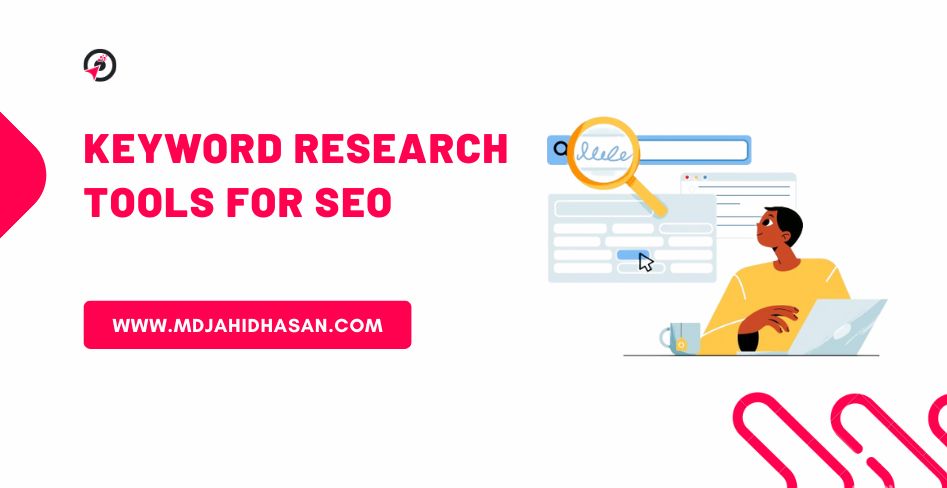
Keyword research is the cornerstone of any successful SEO strategy, acting as the bridge between user intent and online content. In this guide, we delve into the 19 best free and paid keyword research tools, each offering unique features to enhance your digital marketing efforts. Understanding the Significance of Keyword Research: Before exploring the intricacies of keyword research tools, let’s grasp why this process is vital for SEO success. Keywords serve as the foundation of search engine optimization, connecting users with relevant content and driving organic traffic to websites. By identifying the right keywords, businesses can optimize their content and improve their visibility on search engine results pages (SERPs). What is a Keyword Research Tool? A keyword research tool is a specialized software or online platform designed to help users identify relevant keywords and analyze their search volume, competition level, and potential for driving organic traffic. These tools employ advanced algorithms and data analytics to provide actionable insights into keyword trends, search behavior, and user intent. Why Keyword Research Tools are Essential: Google Keyword Planner: A staple in any SEO toolkit, Google Keyword Planner provides valuable insights into keyword search volume, competition, and cost-per-click (CPC). Its integration with Google Ads makes it a go-to tool for crafting data-driven SEO campaigns. Google Trends: Offering real-time data on search trends, Google Trends enables users to identify emerging topics and capitalize on trending keywords for enhanced visibility. Moz Keyword Explorer: Renowned for its accuracy and comprehensive keyword metrics, Moz Keyword Explorer offers insights into keyword difficulty, opportunity, and potential, guiding informed decision-making in SEO strategy. Keywords Everywhere: This browser extension integrates seamlessly with popular search engines, providing instant keyword metrics, related search terms, and competitor insights for efficient keyword research. Semrush: A versatile SEO toolkit, Semrush offers a suite of keyword research features, including competitor analysis, keyword difficulty assessment, and content optimization recommendations, empowering users to stay ahead of the curve. Free Keyword Tool by Backlinko: Developed by renowned SEO expert Brian Dean, this tool simplifies keyword research with its user-friendly interface and comprehensive keyword suggestions, ideal for beginners and seasoned professionals alike. Soovle: Soovle aggregates autocomplete suggestions from multiple search engines, enabling users to uncover hidden gems and long-tail keywords with ease. TopicRanker: Leveraging advanced natural language processing (NLP) algorithms, TopicRanker analyzes semantic relationships between keywords and topics, helping users discover untapped content opportunities and semantic search trends. Jaaxy: Known for its lightning-fast keyword analysis and competitive intelligence features, Jaaxy provides actionable keyword insights, domain availability checks, and niche discovery tools for maximizing SEO impact. Google Search Console: While primarily known for website performance monitoring, Google Search Console offers valuable keyword data, including impressions, clicks, and average position, refining keyword targeting strategies. Ahrefs Keywords Explorer: Renowned for its extensive keyword database and robust backlink analysis tools, Ahrefs Keywords Explorer equips users with comprehensive keyword insights, competitor research, and content gap analysis features. SECockpit: Combining keyword research with market analysis, SECockpit offers actionable data on keyword competitiveness, search trends, and commercial intent. KeywordTool.io: With its vast database of long-tail keywords and autocomplete suggestions, KeywordTool.io simplifies keyword discovery, enabling users to uncover valuable insights for content optimization and PPC campaigns. KWFinder: KWFinder offers intuitive keyword research tools, including keyword difficulty scores, search volume trends, and SERP analysis, empowering users to identify high-impact keywords with ease. QuestionDB: Focused on answering users’ questions and addressing informational queries, QuestionDB provides valuable insights into popular search queries, FAQ topics, and content opportunities, making it a valuable resource for content creators and SEO professionals. Serpstat: Serpstat simplifies keyword research, rank tracking, and competitor analysis, empowering users to streamline their SEO workflows and achieve measurable results. AlsoAsked: Visualizing related questions and semantic relationships between keywords, AlsoAsked helps users uncover valuable insights and optimize their content for semantic search. KeywordTool: With a range of features including keyword suggestions, search volume data, and competitor analysis, KeywordTool is a valuable asset for enhancing online visibility. Neil Patel: With expertise in digital marketing and SEO, Neil Patel provides valuable insights and tools for keyword research, content optimization, and competitive analysis. Conclusion: Keyword research is the bedrock of successful SEO strategies. By leveraging the power of the 19 best keyword research tools outlined in this guide, businesses can gain valuable insights into search trends, user behavior, and competitive landscapes. Embrace the power of keyword research, and unlock the full potential of your SEO strategy today.
Local SEO Strategy for Flooring Contractors

Best Local SEO Strategy for Flooring Contractors and Floor Contractors Companies Establishing a robust local SEO strategy is paramount for success in a fiercely competitive world of flooring contractors and companies. Local search engine optimization (SEO) optimizes your online presence to attract more business from relevant local searches. For flooring contractors, whose services are often sought after by residents and businesses, a well-crafted local SEO strategy Flooring Contractors can significantly boost visibility, credibility, and ultimately, profitability. First and foremost, understanding the unique dynamics of the local market is crucial. Local seo for flooring contractors operate within specific geographic areas and tailor SEO efforts to target local keywords, such as ”flooring service,” ”city flooring services Florida near Me” ”hardwood flooring Florida” ” hardwood flooring nearby,” ”hardwood flooring Jacksonville fl,” “hardwood flooring installation,” or “hardwood flooring near me,” can help capture the attention of nearby customers actively seeking such services. 1. Keywords Research: When it comes to local SEO for flooring contractors, conducting thorough keyword research is crucial for optimizing your website and local seo content. There are two main types of keywords to consider: Implicit Keywords: These are terms that users might search for when looking seo marketing for flooring contractors in their local area. Examples include “flooring installation near me,” “local flooring contractors,” or “best floor contractors in my city.” etc. Explicit Keywords: These are specific terms related to the services you offer or the types of flooring materials you work with. Examples include “Hardwood Floor Installation City” “Carpet Replacement in Florida,” ”my City’s Laminate Flooring” “Tile Flooring Specialists” ”flooring Contractor My Area” ”flooring Contractors Near Me” ”flooring Stores Near Me” etc. Now, here are some free and paid keyword research tools for SEO that you can use for local keyword research– 5 Best Free Keyword Research Tools Google Keyword Planner Google Trends Soovle Keyword Generator Answer The Public 5 Best Paid Keyword Research Tools SEMrush Ahrefs Moz Local BrightLocal Neil Patel to identify relevant keywords with high search volumes and low competition in your target geographic area. 2. Competition Analysis: Analyzing your keyword competitors’ strategies can provide valuable insights into what is working in your industry and where you can improve. Here’s how to analyze your competition for local SEO: Keyword Analysis: Identify the keywords your competitors are targeting in their website content, meta tags, and anchor text. Pay attention to which keywords are driving the most traffic to their sites. In-depth Competitors: Identify the main competitors in your niche. Market Research: Analyze competitors’ products, services, and pricing strategies. SEO Comparison: Evaluate competitors’ website SEO performance. Product or Service Comparison: Compare your offerings with those of your competitors in terms of features, quality, pricing, and customer value. Identify areas where you excel and where you might be falling short. Content Analysis: Assess competitors’ content quality, relevance, and engagement. Backlink Study: Examine competitors’ backlink profiles for insights. Keyword Strategy: Identify keywords competitors rank for and their SEO strategies. Social Media Presence: Evaluate competitors’ social media activities and engagement. SWOT Analysis: Conduct a SWOT analysis to understand strengths, weaknesses, opportunities, and threats. Actionable Insights: Use findings to refine your SEO strategy and gain a competitive edge. Continuous Monitoring: Regularly monitor competitors to stay updated and adapt strategies accordingly. On-Page Factors: When it comes to optimizing your website for search engines, On-Page Factors play a crucial role in determining your website’s visibility and ranking. These factors encompass various elements that you have direct control over on your web pages. By strategically optimizing these elements, you can enhance your website’s relevance, authority, and user experience, thereby improving its search engine ranking position (SERP). Key On-Page Ranking Factors for SEO: Title Tags: Crafting compelling and keyword-rich title tags is essential for signaling the relevance of your content to search engines and users. Meta Descriptions: Writing informative and engaging meta descriptions can improve click-through rates and provide search engines with additional context about your page. Heading Tags: Properly structured heading tags (H1, H2, etc.) help organize your content hierarchically and improve readability for both users and search engines. Keyword Optimization: Strategically placing relevant keywords throughout your content, including in headings, paragraphs, and image alt text, helps search engines understand the topic of your page. URL Structure: Creating clean and descriptive URLs that include target keywords can improve both user experience and search engine crawlability. Image optimization: Schema markup: Internal links: Alt text: Social signals: Content Quality: Publishing high-quality, relevant, and engaging content is paramount for attracting and retaining visitors, earning backlinks, and boosting search engine rankings. By focusing on these On-Page Factors and implementing best practices, you can optimize your website to better meet the needs of both users and search engines, ultimately driving organic traffic and achieving your on-page SEO goals Off-Page Factors: Assess your competitors’ backlink profiles to understand where their external links are coming from and the authority of those sources. This can help you identify potential link-building opportunities for your website. Key Off-Page Factors for SEO: Backlinks: High-quality backlinks from authoritative websites signal to search engines that your site is reputable and worthy of attention. Social Signals: Engagement and shares on social media platforms contribute to a website’s visibility and credibility. Online Mentions: Brand mentions across the web, even without a direct link, can positively impact SEO. Guest Blogging: Contributing valuable content to other websites in exchange for backlinks strengthens your site’s authority and expands its reach. Directory Listings: Being listed in relevant directories improves visibility and validates your site’s authenticity. Influencer Endorsements: Collaboration with influencers or industry experts can boost your site’s credibility and attract new audiences. Local SEO: Optimizing for local search, including local business listings and reviews, enhances visibility for geographically targeted searches. Focusing on these off-page factors, you can bolster your website’s SEO performance, increase organic traffic, and establish a strong online presence in your niche or industry. Technical Factors: When it comes to optimizing your website for search engines, Technical Factors play a crucial role in determining your online visibility and ranking. These factors
Why Is An SEO-Friendly Website Important For Business?
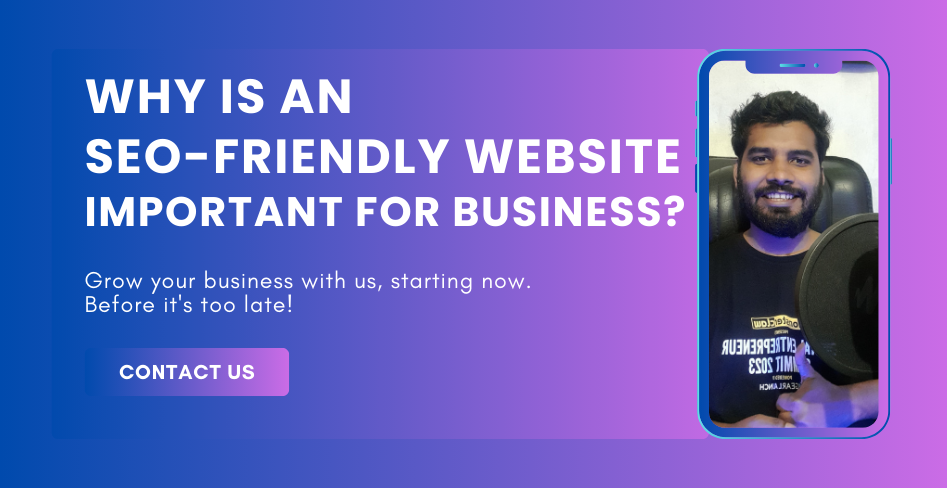
SEO-Friendly Website for Business Growth In today’s digital age, having a strong online presence is crucial for the success of any business. One of the key factors that contribute to this online visibility is having an SEO-friendly website. In this article, we’ll delve into why having an SEO-friendly website is paramount for businesses and provide essential tips on how to create one. Why Is An SEO-Friendly Website Important For Business? 1.Increasing Monthly Organic Traffic An SEO-friendly website ensures that your content ranks higher in search engine results pages (SERPs), leading to increased organic traffic. By optimizing your website for relevant keywords, you make it easier for potential customers to find you online. 2.Provides A Seamless User Experience A well-structured and optimized website enhances user experience, leading to higher engagement and lower bounce rates. This, in turn, signals search engines that your site is valuable to users, further boosting its rankings. 3.Get Your Business The Right Attention With billions of searches conducted on search engines every day, having an SEO-friendly website ensures that your business gets the attention it deserves. By appearing at the top of search results, you increase the likelihood of attracting qualified leads and converting them into customers. 4.Improves Your Brand Credibility High rankings in search results instill trust and credibility in your brand. Users tend to perceive websites that appear on the first page of search results as more trustworthy and reliable, leading to increased brand credibility and recognition. 5.Optimize For Conversion An SEO-friendly website is optimized not just for traffic but also for conversions. By targeting relevant keywords and optimizing conversion paths, you can turn website visitors into paying customers more effectively. 6.Improves Your Online Reputation A well-optimized website with high-quality content helps build a positive online reputation for your business. Positive reviews, social proof, and authoritative content contribute to establishing your brand as a leader in your industry. 7.Improves The Page Loading Speed Page loading speed is a crucial factor in both user experience and search engine rankings. An SEO-friendly website is optimized for speed, ensuring fast loading times and improved performance across all devices. 8.Make Your Website Responsive With the increasing use of mobile devices, having a responsive website is essential. An SEO-friendly website is designed to adapt seamlessly to different screen sizes and devices, providing users with a consistent experience. 9.More Social Media Attention An SEO-friendly website not only improves your visibility on search engines but also on social media platforms. By creating shareable content and integrating social media buttons, you can increase social media engagement and drive more traffic to your website. 10.A Cost-Effective Method That Keeps Paying Back Investing in SEO-friendly website development is a cost-effective long-term strategy for business growth. Unlike paid advertising, which stops generating leads once you stop paying, SEO continues to drive organic traffic and leads over time. How To Create An SEO-Friendly Site? Use An Easy-To-Access Website Structure A clear and intuitive website structure makes it easier for search engines to crawl and index your content. Use descriptive categories and subcategories to organize your content logically. Make The Site Indexable Ensure that search engines can crawl and index all of your website’s pages by avoiding barriers such as flash content, broken links, and duplicate content. Have A Responsive Design Optimize your website for mobile devices to provide a seamless user experience across all devices. A responsive design not only improves user experience but also boosts your site’s mobile search rankings. Make The Website Search Focused Target relevant keywords and phrases throughout your website’s content, meta tags, and URLs to improve its visibility in search results. Create Compelling And Useful Content Produce high-quality, informative content that addresses the needs and interests of your target audience. Quality content not only attracts visitors but also encourages engagement and sharing. Optimize Title, Meta Tags, And URLs Craft descriptive and keyword-rich titles, meta descriptions, and URLs for each page of your website to improve its relevance and visibility in search results. Focus On Readability Make your content easy to read and understand by using clear headings, bullet points, and concise sentences. Avoid jargon and technical language that may confuse readers. Internal Linking Include internal links within your content to guide users to related pages and improve website navigation. Internal linking also helps search engines discover and index new pages on your site. Improve Page Loading Time Optimize your website’s performance by minimizing server response times, compressing images, and reducing unnecessary scripts and plugins. Make Sure Your Website Is Secure Ensure that your website has a valid SSL certificate and uses HTTPS encryption to protect user data and enhance security. Optimize Images Optimize images for size and format to improve page loading speed without compromising quality. Use descriptive filenames and alt text to make images more accessible to search engines. Ready To Create An SEO-Friendly Website? By following these tips and strategies, you can create an SEO-friendly website that not only attracts more organic traffic but also enhances user experience, builds credibility, and drives business growth. Remember that SEO is an ongoing process, so regularly monitor and update your website to stay ahead of the competition in search rankings.




